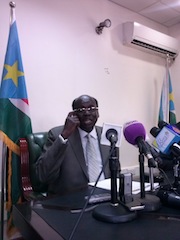Juba recalls top diplomats from key countries
March 1, 2014 (JUBA) – South Sudan’s government has admitted recalling ambassadors from key countries, but denied its decision was due to their failure to convince the host countries that there was an attempt to overthrow President Salva Kiir’s administration in mid-December last year.

“The recall of the heads of mission from these countries is the normal routine in foreign affairs. They were recalled before for a briefing and they have been called for a general transfer within the ministry,” Marial said on Saturday.
“Some of them will go to new places. Others will come to the headquarters. It is a transfer within the ministry, which is the first transfer to occur in the ministry of foreign affairs,” he added.
After his official visit to London in early February, the foreign minister claimed that he had convinced the international community of the government’s narrative that last year’s alleged failed coup attempt by former vice-president Riek Machar sparked off the conflict.
Marial did not, however, mention any specific countries that seemed convinced with South Sudan government’s version of events that occurred. Members of the United States administration said there is not enough evidence to prove the was a coup attempt on the night of 15 December.
The fighting between members of the presidential guard came after weeks of tension within South Sudan’s ruling party (SPLM), especially after Machar and others openly criticised President Kiir’s leadership, and further accused the latter of becoming increasingly dictatorial since South Sudan’s independence in 2011.
Machar, who denies instigating the uprising, said he now controls the soldiers who largely defected in the capital, Juba as well as the states of Jonglei, Unity and Upper Nile. The ex-vice president now leads an armed rebellion against the government.
Talks to end the violence, which has killed an estimated 10,000 people and displaced almost 900,000 people, have stalled over Machar’s demands that political detainees be released and that the Ugandan army withdraw and stop fighting alongside the South Sudanese army (SPLA).
(ST)
- ST – International pressure reduces on South Sudan: FM Marial
- ST – South Sudan violence was not genocide: minister
- Barnaba Marial Benjamin

